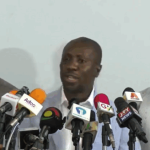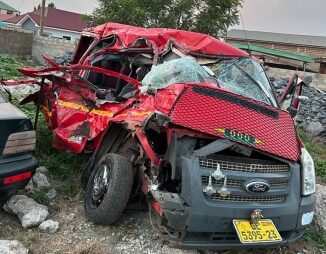The Chief Executive Director of the Ghana Mental Authority, Dr. Akwasi Osei, has disclosed he is of the view that homosexuality is a disorder that can be corrected.
According to the psychiatrist, some fraction of queer people “were born with an inborn tendency of abnormal hormonal imbalance, which can be corrected. Others also involved themselves in this sodomy because friends and relatives are into it,” he said in a TV interview on Wednesday, October 20.
Dr. Osei, who used to head the Accra Psychiatric Hospital, insisted that homosexuality is a hormonal disorder that can be corrected through stringent procedures.
“Some of those practicing the LGBTQI+ are born with estrogen and testosterone disorders,” he claimed.
Discussions about LGBTQ+ rights in Ghana touch on sensitive chords: culture and religion. Crusaders behind sn anti-LGBTQ bill base their arguments on the belief that LGBTQI+ identities are alien to the country’s cultural norms and values and are also frowned upon by all major religious groups in Ghana.
“Young people practicing LGBTQ+ involve themselves in it without reasoning how society will look at them,” he told Accra-based Onua TV.
He also referenced the early 1960s psychiatric observations when gays and lesbians were referred to as a mentally ill group of people because they craved same-sex relations that were contrary to the norms of the law.
After decades of describing homosexuality as a mental abnormality, the American Psychiatry Association (APA) in 1973 scrapped that description due to further research.
That breakthrough in the scientific community prepared the grounds for the furthering of rights for queer people in most of the Western world.
Behavioral and neurological scientists are inconclusive about human sexuality but deny that there is a fact of human DNA that makes a person heterosexual or homosexual.
While transgenderism has been linked to hormonal imbalances, there is no proof, as claimed by Dr Osei, that sexual attraction is linked to hormonal imbalances.
The debate over the anti-LGBTQ bill
The bill which was first read in parliament on August 2, 2021, is spearheaded by eight legislators: MP for Ningo-Prampram Sam George, Ho West MP Emmanuel Bedzrah, MP for Kpando Della Adjoa Sowah, and John Ntim Fordjour, the MP for Assin South.
The Christian Council of Ghana – an umbrella body of Christian churches in Ghana – has declared its support to the bill. “The council wishes to state unequivocally that it supports the bill and prays that it will see the light today… Let us protect the good family system that we have inherited from our forebears,” it said in an official statement.
The Office of the National Chief Imam also supports the bill stating, “homosexuality is a deviant behavior totally unacceptable in Islam. Although our religion allows us the latitude to ponder and reconsider some issues, homosexuality is certainly not one of them”.
The bill seeks to criminalize LGBTQI+ advocacy and its practice for at least five years.
However, an 18-member group campaigning against the bill’s passage argues that “the bill violates all the fundamental freedoms guaranteed by the 1992 Constitution”, adding that when passed into law, it would send Ghana to the dark ages of lawlessness.
“The bill violates virtually all the key fundamental freedoms guaranteed under the constitution, namely the right to freedom of speech and expression, the right to assemble, freedom of association and the right to organize, the right to freedom from discrimination and the right to human dignity,” leader of the group, Lawyer Akoto Ampaw said at a press conference on Monday (October 4).
Other members of the 18 member group are Professor Emerita Takyiwaaa Manuh, Communication Specialist, Professor Kwame Karikari, Professor Kofi Gyimah-Boadi, Professor Audrey Gadzekpo of the Department of Communication Studies, and Dean of the School of Information and Communication Studies, University of Ghana, Dr Rose Mensah-Kutin, Dr. Yao Graham, Professor Dzodzi Tsikata and Professor H. Kwasi Prempeh of Centre of Democratic Development (CDD).















